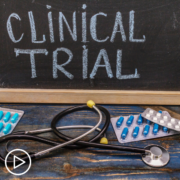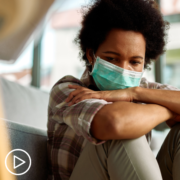Breast Cancer Clinical Trials | What Are the Phases?
Breast Cancer Clinical Trials | What Are the Phases? from Patient Empowerment Network on Vimeo.
What do breast cancer patients need to know about the phases of a clinical trial? Expert Dr. Jame Abraham explains the trial process and reviews what happens during each phase.
Dr. Jame Abraham is the chairman of the Department of Hematology & Medical Oncology at Cleveland Clinic and professor of medicine at Cleveland Clinic Lerner College of Medicine. Learn more about Dr. Abraham.
See More from Breast Cancer Clinical Trials 201
Related Resources:

|

|

When Should Breast Cancer Patients Consider a Clinical Trial? |
Transcript:
Katherine:
Dr. Abraham, many people are confused about how breast cancer clinical trials are conducted. What are the phases of a clinical trial?
Dr. Abraham:
So, that’s a really good question. It’s a really important question. And I’m kind of saying, there’s so many new things, and I’m talking about genomic testing, and I’m talking about all these new treatments. As I mentioned, I’ve been doing breast cancer for 20 years. So, every year, we are making huge progress in the treatment of breast cancer. Even then, more than 40,000 women will lose their life because of breast cancer. So, we have a long way to go. As you know, the only way we can make things better for tomorrow is by doing clinical trials. And there are so many different types of clinical trials. I’ll talk about that in a second.
Every new treatment we have today is coming out through a clinical trial, and someone, somewhere, said yes to a new treatment, or will be part of a trial. And that’s the reason we have a new drug today, and that’s making things better for tomorrow.
So, a clinical trial is extremely important, and I’ll say, a clinical trial is the gold standard of cancer treatment. And unfortunately, only less than seven percent of adults in the U.S. are enrolled in a clinical trial. Well, of course, that’s many reasons for that, but let me just make it clear. I know people sometimes worry, “Oh, by being part of a clinical trial, I’m a guinea pig.” No. No, no. Clinical trials are run with high ethical standards. So many committees review that, make sure it’s scientifically sound, it’s safe, and it protects the patient.
So, there’s so many layers of protection for the patients before anyone enters in a clinical trial.
So, there are treatment trials and non-treatment trials, and I’ll focus on – let me focus on treatment trials, not which other ones are making all these changes in the clinic. So, I’ve been doing trials for the last 20 years or so, or being part of a number of regional, and national, or global clients.
So, there are three major types of trials. One, because Phase I, Phase I. That’s the earliest form of clinical trial, and we have some, what they call as, preclinical data. A drug is found to be promising, but we don’t have too much, if I can say, data, in patients, or humans.
So, Phase I is the first human trial, which is looking for the right dose of the drug, what side effects we can expect, and we kind of look at how the drug is metabolized in the body. So, that’s the Phase I trial.
The second one is Phase II, Phase II trial. Phase II trials are looking for efficacy, and how active this drug is in breast cancer. And the third type of trial is Phase III, Phase III. Phase III is what we call as, randomized trials. Means there’s a standard treatment, and now, we have this new drug. The question is, is the new drug better than the standard treatment? So, Phase III, it’s randomized. It’s divided into two groups. One group will get the standard treatment, and the second group will get this new treatment.
And then, we’ll come back and compare these two, and see which is better. That’s Phase III.
So, there is Phase IV, that’s, they call as, a post-marketing study, and once the – based upon the phase, early phase trials, the FDA can approve, or not approve, a drug. And let’s just say, if it’s approved, it’s in the market. Then, the patients can potentially go for a, what we call as, phase – I mean, potentially, we can do a Phase IV study. That’s post-marketing study.










